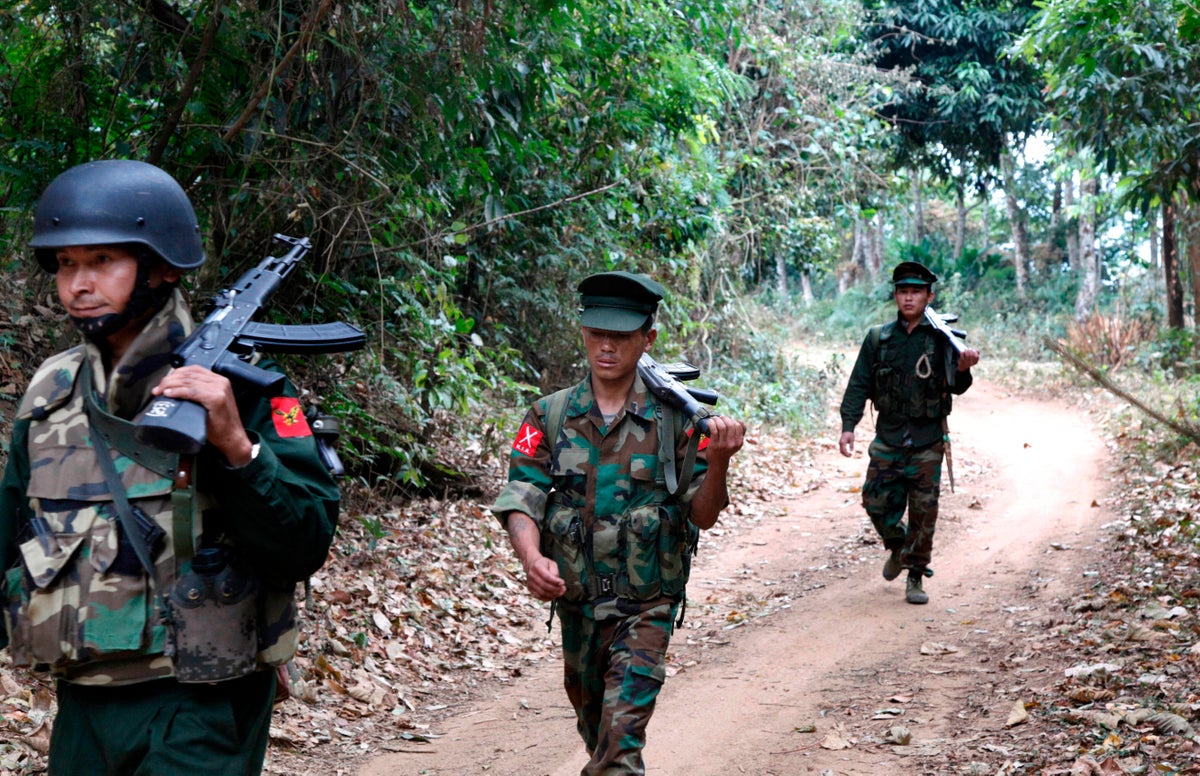
A powerful rebel group has seized a key trading town in northeastern Myanmar on the Chinese border, taking control of a lucrative rare earth mining hub in another setback for the military-led government, according to witnesses.
The apparent loss of Kanpaiti to the Kachin Independence Army leaves Myanmar's military in control of only one town with a border crossing, Muse, and deprives it of potential profits from the mines that provide China with rare earth minerals critical for electric motors and wind turbines, as well as high-tech weapons and a broad range of electronics.
Neither Col. Naw Bu, the KIA's spokesperson, nor Thet Swe, spokesperson for the military, responded to multiple requests for comment, but several local media outlets reported that Kanpaiti fell last week. The ongoing civil war and military restrictions make travel for journalists nearly impossible, but the reports were confirmed by witnesses by telephone.
Video clips circulating on social media, which could not be independently verified, showed what was said to be a KIA member raising the group's flag at the tunnel through the mountain to China. Other clips showed a vast quantity of weapons allegedly captured by the KIA.
The military seized power from the elected government of Aung San Suu Kyi in February 2021, triggering intensified fighting with long-established armed militias organized by Myanmar’s ethnic minority groups in its border regions which have struggled for decades for more autonomy.
The once-mighty armed forces, known as the Tatmadaw, have suffered a series of unprecedented defeats over the past year, especially in areas to the east near the Chinese border and in the western state of Rakhine, after an alliance of three powerful militias launched a coordinated offensive on Oct. 27, 2023.
Since then, other militias organized along ethnic lines have joined in, including the KIA in the northern state of Kachin.
In Kachin's so-called Special Region 1, where Kanpaiti is located, the KIA since late September has been increasing assaults on a rival ethnic militia, the New Democratic Army-Kachin, which is allied with the government military and had provided border guard forces.
The NDA-K also controlled the web of small, unlicensed operations where heavy rare earth elements are mined, then sold directly to China’s big state-owned mining conglomerates or through intermediaries.
There are more than 300 unregulated mines in the area, producing most of the $1.4 billion in rare earths for sale to China last year “at a terrible cost to the environment and local communities,” according to a report issued by London-based environmental group Global Witness in May.
It's not clear how much of the profits flowed to the military government, and how much directly to the NDA-K, however, and while the loss of any revenue stream would be bad for the military, the fall of Kanpaiti is not necessarily a game changer for the overall conflict, said Morgan Michaels, a Singapore-based analyst with the International Institute of Strategic Studies who runs its Myanmar Conflict Map project.
“This is another series of embarrassing losses for the regime, but may not significantly affect the regime’s ability to wage war,” he said. “China had already shut most of the border to dissuade the KIA’s offensives, and the regime is thought to primarily generate revenue through other means than rare earths.”
China was able to use its close ties to the regime and the Three Brotherhood Alliance groups to broker a ceasefire in January in northern Shan state, where much of the fighting has been. Hostilities resumed five months later after the ethnic alliance said the military had violated the ceasefire and has shown no signs of stopping, despite intense pressure from Beijing.
China has likewise been pushing the KIA in Kachin to end the fighting, which has stopped cross-border trade, to little end.
In its September push, the KIA was able to quickly seize four towns in Kachin, with the exception of Kanpaiti, including the NDA-K headquarters of Pang War.
KIA forces advanced toward Kanpaiti on Nov. 20, and since consolidating control have called for the hundreds of residents who fled to return, a local community leader said, speaking on condition of anonymity for fear of arrest.
The report was confirmed by a spokesperson for Kachin Human Rights Watch, which is not affiliated with the New York-based watchdog group of a similar name, and a resident who saw the KIA troops enter the town. Both spoke on condition of anonymity for fear of arrest by authorities.
Multiple Kachin-based news outlets and other Myanmar media reported that 300 government troops were able to escape by fleeing into China, then crossing back into Myanmar at the regime-controlled border town of Muse.
Kachin Human Rights Watch's spokesperson said he had reports of regime soldiers fleeing to safety, but did not have further details.







